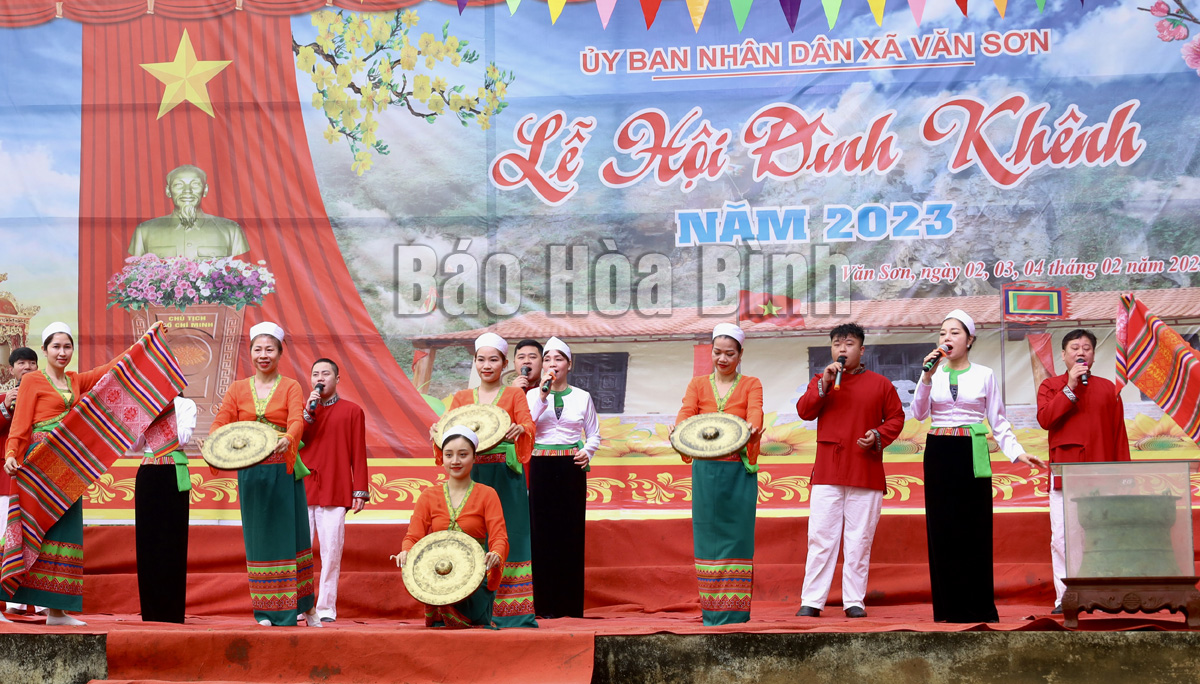
(HBO) - The authority of Lac Son district has paid heed to taking measures to exploit the unique Muong culture and untouched natural landscapes for tourism development, aiming to turn tourism into a spearhead economic sector, thus creating jobs and incomes for people and businesses, and increasing state budget revenue for the locality.
The identity
of Muong culture is spotlighted at the Khenh Communal HouseFestival 2023
in Van Son commune.
Boasting
beautiful natural landscapes
The highland communes of Ngoc Son, Ngoc Lau, and
Tu Do boast great potential for tourism development because they possess
attractive destinations.
Notably, Ngoc Son commune is home to Ba Nha
international parachuting site, which was selected by the General Department of
Sports to organise the opening ceremony of the Vietnam Paragliding Open
Championship in 2014 thanks to its ideal location and beautiful scenery. From
the top of Mount Ba Nha, visitors can enjoy a panoramic view of Vu Ban town and
centre communes of the district.
Meanwhile, Bai Bui in Ngoc Lau commune is
likened to a "green steppe" located on the Ngoc Son - Ngo Luong - Cuc
Phuong trekking route. It is suitable as a stopover for sightseeing, and
organising camping and campfire activities.
Mu waterfall in Tu Do commune is one of the most
attractive tourist destinations in the locality. Located at over 1,000 metres
above the sea level and at the start of the legendary Truong Son mountain
range, Mu waterfall is impressed by its majestic and untouched beauty, and pure
and cool water, and strong water flows. The waterfall is surrounded by an
untouched and picturesque forest landscape. Mu Waterfall is truly a
"paradise” for foreign tourists and youngsters who love motorbike tours to
explore.
Another impressive destination is Thung Hill in
Quy Hoa commune, which is known for its green forests, peaceful small villages
and amazing terraced fields.
Along Tan Lap and Mien Doi communes, Quy Hoa
boasts an extensive system of terraced fields, becoming one of the addresses
being researched and surveyed by scientists towards building a terraced field
heritage dossier in association with tourism development planning.
Lac Son also has a cool climate, hot springs and
Mountain Cot Ca, which is considered the roof of Muong Vang and covered with
fog all year round.
Canh Tang lake with a water surface area of
about 800 ha in Yen Phu commune is suitable for eco-tourism development.
Home to valuable cultural treasures
In addition to natural resources, Lac Son
district is renowned for the traditional cultural values of the Muong ethnic
people, closely associated with many famous places such as Muong Khu, Muong Vo,
Muong Khoi, Muong Vang. Over 91% of Lac Son’s population are Muong ethnic
people.
In recent years, many community-based tourism
models have been formed in Tu Do commune under the direction of ecotourism
development inassociationwith preserving cultural identity.
Traditional cultural values and customs of the
Muong people are still preserved in many villages in the district such as Muong
Vo and Muong Khoi, from traditional stilt houses, and unique costumes to the
Muong language and lifestyle, traditional crafts and cuisine.
Muong Vang is also one of the cradles of folk
singing, and other unique intangible cultures, including traditional festivals,
folk games, and ancestral worship traditions.
The district is also home to cultural and
historical tourism destinations, which become attractive to vistors.
According to Vice Chairman of the People’s
Committee of Lac Son district Bui Van Duong, Lac Son boasts potential to become
a branded tourism area.
The district needs to make more efforts to fully
tap the potential, towards further promoting tourism development and turning
tourism into a local spearhead economic sector, he said./.
The Standing Board of the Hoa Binh provincial Party Committee has agreed in principle on a proposal by the Standing Board of the Party Committee of Hoa Binh city to gather feedback on the city’s 1:2000 zoning plan, which forms part of its broader urban development strategy.
Hoa Binh province has made notable progress in public administration reform and digital government development, with the satisfaction index among citizens and businesses reaching over 84%, according to recent government evaluations.
Thanks to great efforts by local authorities in recent times, the governance and public administration performance of Mai Chau district has been significantly improved.
In the afternoon of June 6, the Party Committee, the People's Council, the People's Committee and the Fatherland Front of Lac Son district solemnly held a meeting to celebrate the 139th anniversary of the district's founding (1886–2025) and the 79th anniversary of the establishment of the district's Party Committee (1946–2025). There was the attendance of Mr. Bui Van Thang, the Vice Chairman of the Provincial People's Council; Mr. Quach Tat Liem, the Vice Chairman of the Provincial People's Committee; Ms. Dang Bich Ngoc, the Deputy Head of the National Assembly Delegation of the province; as well as the former leaders of the province and district through various periods, who are the natives of the district.
Implementing the Politburo’s Resolution No. 57-NQ/TW on breakthroughs in science – technology, innovation, and digital transformation is a golden opportunity for the northern mountainous province of Hoa Binh to renew growth model, improve competitive edge and shorten digital gap.
Resolution 57-NQ/TW, issued by the Politburo on December 22, 2024, identifies sci-tech, innovation, and digital transformation as strategic breakthroughs to build a developed and prosperous nation. In Hoa Binh province, this spirit is not just a slogan, it’s being put into action through concrete initiatives that form a "new development triangle”: digital citizenship, digital economy, and digital administration.



